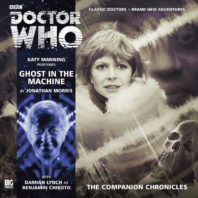
Released October 2013
Stepping outside the TARDIS into the darkness of a mysteriously empty base, Jo Grant finds the Doctor’s body frozen in unconsciousness and holding the ship’s log recorder with only the simple message ‘Use me’ attached. As she traverses the corridors and records her every move, she quickly discovers the true horror lying at the heart of the shadows in Jonathan Morris’s ‘Ghost in the Machine.’
With the setup of Jo speaking into and listening to the recorder constantly as she uncovers the subtle differences in assumed constancies, it’s unsurprising that early portions of ‘Ghost in the Machine’ rely on overly descriptive dialogue, this constant flow of narration unfortunately taking away some of the listener’s ability to truly react to the tense atmosphere and unsettling events being portrayed. This is simply a function of the script, however, and in no way reflects upon Katy Manning who gives a tremendous performance that captures all of the needed trepidation, uncertainty, and determination to make such a sequence compelling and believable while staying true to all of the characterisation that has come before for a character who admittedly has a penchant for sometimes rambling.
Quite brilliantly, however, Jo’s long-winded dialogues early on become a tremendous benefit to her once the true scope of the danger is introduced. While the conceit behind the villain who was born on Thomas Edison’s first audio recording of Mary Had a Little Lamb and who can pass itself between others once they record themselves with those words is perhaps one of the more far-fetched that this range has produced, the result is nonetheless a powerful one, and the revelation that those confined to recordings can only speak with words they previously recorded is all the more intriguing. While not too much is done with this idea beyond pointing out certain words and background events that characters thus cannot remember, it’s still a neat constraint on the typical drama format that heightens the tension and disquiet. Damian Lynch likewise provides a powerful performance as scientist Benjamin Chikoto who is Jo’s only discernible means of attaining information from, and Manning and he combine for some truly chilling scenes highlighted by the manifestation of the Doctor who did not record his own voice to remain safe and so must use the voices of the other two with their vocabulary restraints to put his plan into motion.
‘Ghost in the Machine’ isn’t necessarily the most complex or challenging story, but the unique structure its narrative takes and the strong direction and sound design that bring it to life nonetheless make it an entertaining one. Still, there are moments when silence can be much more powerful than any number of words, and it’s the overreliance on dialogue rather than atmosphere both before and after the recording device comes into play that proves to be the biggest weakness of the story even if that facet is retroactively explained within the context of the story. Yet as a showcase for the immense talents and range of Katy Manning as well as the evocative and gloomy imagery and atmosphere that the audio medium can provide, this is a solid experience that will very much entertain for the duration of its running time.
- Release Date: 10/2013


Leave a Reply